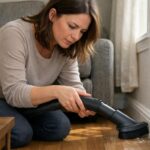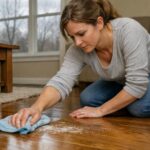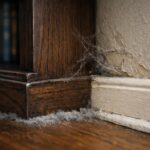If your once-sparkling mirror has become encrusted with grime, streaks, and fingerprints, it’s probably time to clean mirros!
You might think cleaning your mirror is as easy as wiping a towel or newspaper across the smudged glass, and you are right. However, achieving a shiny and spotless mirror does have some sneaky tricks. The secret lies in using the right tools, cleaning products, and techniques. So, keep reading to discover some of the best hacks to clean mirrors. It’s an important part of house cleaning.
Key Takeaways
Before we dive into our mirror-cleaning tips, here’s an overview of what you can expect from this how-to post:
- For regular cleaning, apply cleaner fluid across the mirror glass using a microfiber cloth.
- For a deeper clean, go for a mixture of distilled vinegar and water.
- To tackle the most stubborn residues, rubbing alcohol smeared on bamboo rounds does the trick.
- Use baking soda mixed with vinegar to erase hard water stains.
Products You Will Need
Here are the basic tools and supplies required for cleaning a mirror:
- Dry microfiber cloths
- Distilled water
- White vinegar
- Glass-cleaning fluid
- Reusable bamboo cotton rounds
- Rubbing alcohol
- Baking soda
Let’s Get to Mirror Cleaning
Once you’ve got all the materials in hand, it’s time to start cleaning. Let’s look at four fail-safe ways to clean a dirty mirror:
1. Wipe Down the Mirror Surface with a Microfiber Cloth
According to experts, the best way to clean mirrors is with a high-quality microfiber cloth. Most homeowners use paper towels or newspapers for cleaning, but this isn’t recommended. Not only do paper products generate waste, but they also tend to leave unsightly smears, lint, and dust on the glass. A microfiber cloth cleans your mirror thoroughly without leaving any streaks or lint.
The process is pretty straightforward. Spritz some cleaning fluid onto a dry microfiber cloth and rub across the mirror surface from edge to edge. Begin at the top of the mirror and wipe in broad, zigzag strokes resembling ‘S’ or ‘Z’ shapes. This helps prevent smudging and effectively captures any debris or dirt coating the mirror.
Then, take a fresh, clean microfiber cloth and wipe the mirror dry using the same zigzag motions.
2. Use a Vinegar-Water Blend for Deeper Cleaning
If you want to save yourself some bucks and hassle, create your own glass-cleaning formula at home.
Simply mix a cup of distilled vinegar with a cup of water in a spray bottle. Shake vigorously, and voila, you have the perfect remedy for tackling stubborn streaks and smudges. Not only is this recipe natural, cheap, and practical, but it is also free of soap solvents, unlike store-bought detergents. Excess soap can leave streaks on glass surfaces that can be hard to clean.
To clean the mirror, follow these steps:
- Spray some of the vinegar-water solution onto a microfiber cloth.
- Work your way down from the top of the glass to the bottom in zigzag patterns.
- Dry the mirror with a fresh microfiber cloth using similar motions. Then, take a step back and admire your handiwork: your mirror will now be gleaming like new!
Remember to store your homemade mirror cleaner properly after each use.
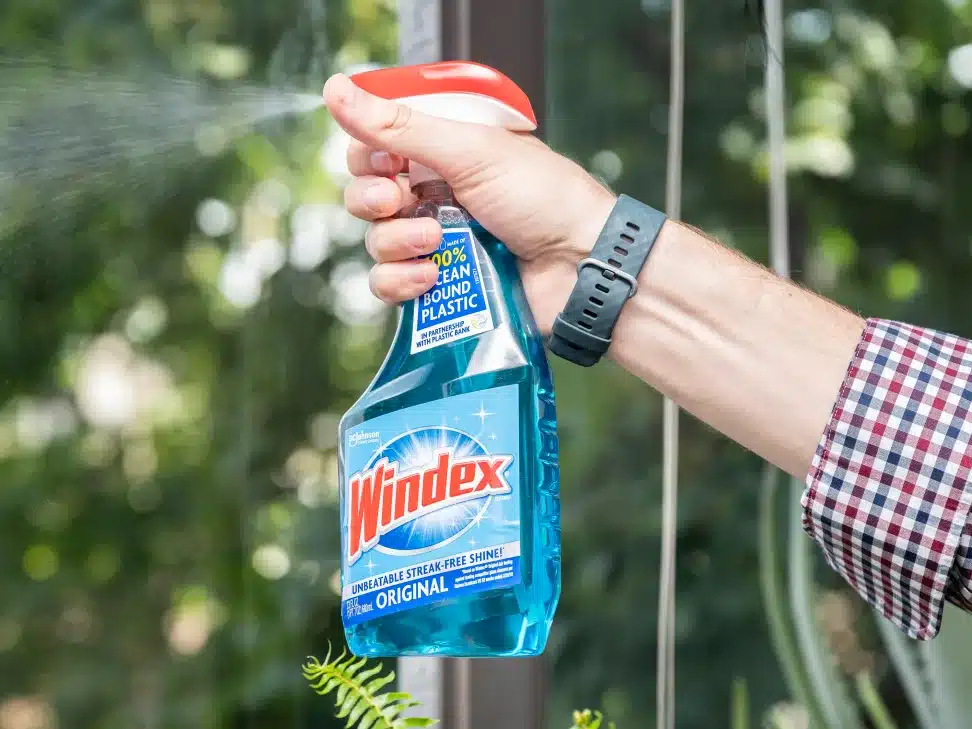
3. Apply Rubbing Alcohol to Remove the Hardiest Streaks
Do you know that you have a tailor-made mirror cleaner right inside your medicine cabinet? Rubbing alcohol is a great way to clean mirrors that endure frequent staining. For instance, your bathroom mirror regularly gets caked with dried-up or cloudy residue from grubby fingerprints, toothpaste, or hair products.
The ideal way to erase such marks is to pre-treat them with rubbing alcohol before cleaning the entire mirror surface.
Wiping untreated areas with paper cloths and glass-cleaning detergents often leaves streaks, which only grow oilier and more stubborn with each swipe. Avoid this by daubing rubbing alcohol onto a bamboo round and applying it to any visible problem spots. This will break up and remove all the congealed gunk from the surface. Then, clean the glass using a dry microfiber cloth.
This simple treatment leaves your bathroom mirror streak-free and gleaming in no time!
4. Use Baking Soda to Get Rid of Hard Water Stains
Hard water is rich in dissolved minerals. It is formed when natural water seeps through deposits of chalk, limestone, and gypsum, which are composed mainly of calcium and magnesium carbonates. You may have noticed your hands remain viscous despite washing them with soap, or your drinking water has a chalky appearance; this is likely due to water hardness.
Hard water can leave unsightly stains on mirrors that are exceedingly tough to clean. Worse, the longer these smudges remain, the thicker they become and, hence, the harder to remove. Such stains are best erased by treating them with baking soda.
Baking soda is a potent cleaning agent. It can eliminate dirt, grease, and grime from virtually any surface. It is also natural, affordable, and easy to use, making it one of the most common household ingredients.
The steps to clean mirrors using baking soda are as follows:
- Combine equal parts vinegar and baking soda in a bowl. Mix until you’ve formed a paste.
- Use your fingers to gently smear the paste across the hard water stains.
- Once the paste is dry, remove it using a clean, moist cloth.
- Dry the mirror surface with another clean cloth.
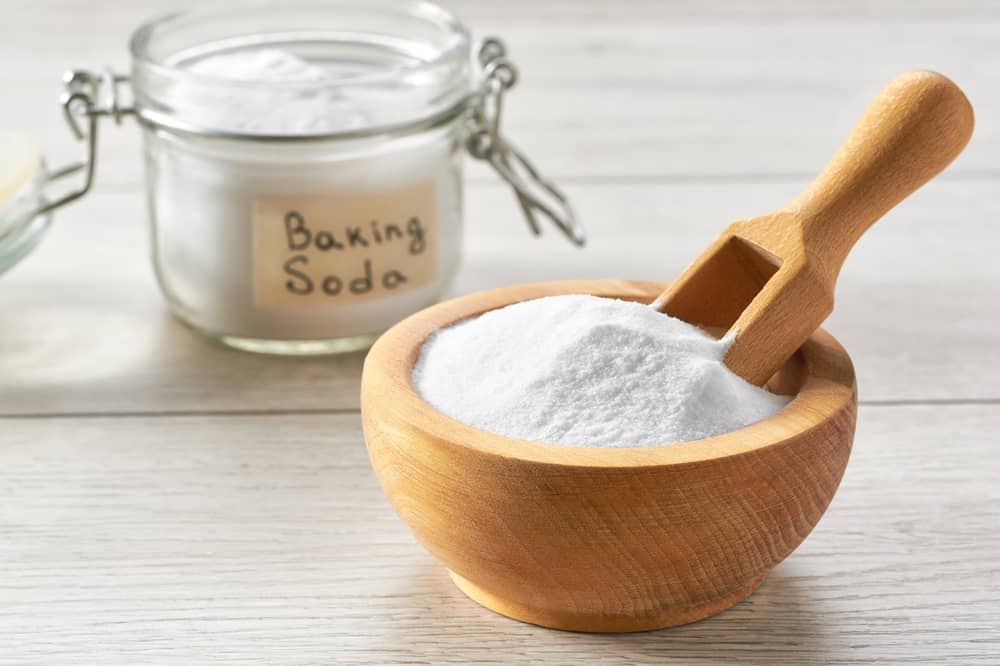
Conclusion
Nothing ruins a room’s appearance like a dirty, grubby, or stained mirror. Clean mirrors are visually appealing and can make your space feel brighter. They also reflect a greater amount of light, thereby enhancing the room’s overall ambiance. Moreover, regular cleaning prevents the accumulation of dirt and grime that can adversely affect a mirror’s quality and lifespan. Well-kept mirrors tend to maintain their appearance for a longer time.
However, if you work long hours and don’t have time for extensive glass cleaning, a great solution is to hire a cleaning agency to do the job for you. Professional cleaners like My Cleaning Angel have the knowledge and expertise to tackle even the most challenging cleaning tasks. These experts will take the burden of deep cleaning off of you and leave your home spotless and immaculate before you know it! Book cleaning services online with us now, it’s easy and simple. Get a quote, see your price and book it now!

FAQs
How frequently should I clean my mirror?
It depends. Accent mirrors displayed in drawing rooms or formal dining rooms only need occasional dusting. However, mirrors that are regularly used require more frequent care. For example, your bathroom mirror is in constant use and needs a daily wipe-down to clear it from water droplets, toothpaste spatters, and other stains. Decorative mirrors hung in living rooms or foyers should be cleaned on a biweekly basis to keep them free of pollutants.
What is the best way to clean a mirror’s frame?
This will depend on the material the frame is made from. If it is wooden, clean it with a duster. Metal frames must be wiped with a soft microfiber cloth soaked in cleaning fluid.
My mirror is becoming increasingly hazy. How do I tackle this?
Haziness is often caused by a buildup of natural residues. Thankfully, the solution is pretty simple. Dip a cotton ball in rubbing alcohol and wipe it over the particularly hazy spots. Next, create a cleaning formula by mixing one part vinegar with four parts warm water. Spritz this mixture thoroughly across the surface. Let it soak for ten minutes if the buildup is considerable. Then, use a microfiber cloth to wipe the mirror dry. This should take care of the haziness.
Is there a way to prevent mirrors from becoming foggy during showers?
Yes, there’s a nifty tip to avoid this. Mix a cup of vinegar, a cup of water, and a teaspoon of dishwashing liquid in a spray bottle. Shake gently, then squirt the mixture directly onto the mirror. After a few seconds, rub the glass dry with a clean microfiber cloth. This quick remedy will prevent your mirror from fogging up for a few days. Continue applying this formula to keep the fogginess at bay.
What types of chemicals and tools are harmful to mirrors?
Many chemicals used for household cleaning can damage your mirror. Bleach, for instance, can leave unsightly streaks and dull the mirror’s gleaming surface. Rubbing alcohol, ideal for many glass surfaces, isn’t recommended for antique mirrors, as it can strip away the delicate finishes on such mirrors. Ammonia can wreak havoc on tinted mirrors, causing discoloration, chipping, or cloudiness. Always use mild, non-toxic cleaners and detergents that are specially designed to clean glass.
Avoid using tools such as steel wool or wire brushes, as they can irreparably damage delicate glass surfaces. Stick to materials like microfiber cloths that glide smoothly across the mirror and help you achieve a streak-free shine.
My mirror has ugly black spots along its edges. What could be the reason?
The best option is to replace the mirror after several years of use. However, if your mirror is a precious antique or family heirloom that you can’t bear to part with, consider ordering a custom frame to encase it in. This will help hide the discoloration.t




